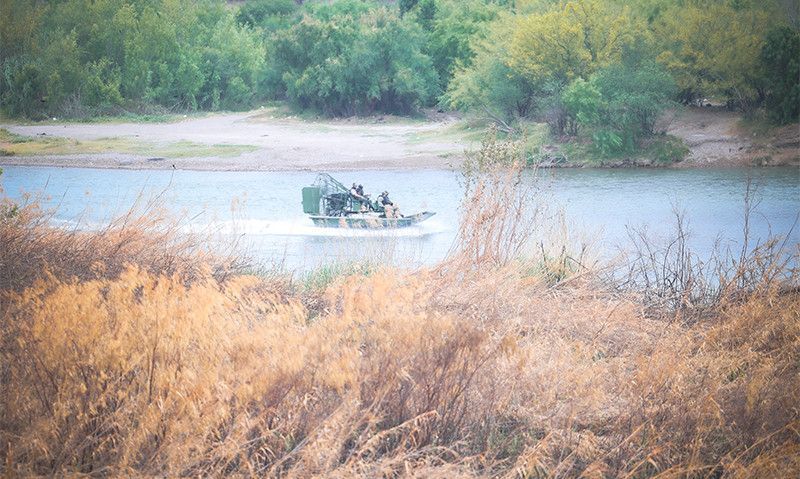
American Legion representatives conduct multiple border visits for first-hand look at the issue, and call on Congress to address the problem.
Illegal immigration is a topic of high importance to The American Legion. It has tracked border policy for decades and remains committed to engaging in dialogue on the evolving issue. Not only is illegal immigration a national security issue, estimates say that 40% of border patrol agents are veterans.
As members of Congress politicize the issue, states fight to exert control and immigrant children face the threat of exploitation, The American Legion is leading the way in forging a solution.
“There has been a lot of political showmanship and conjecture related to illegal immigration across our southern border,” American Legion National Commander Daniel Seehafer said. “But those talking points, used by both sides of the debate, don’t actively work to solve the problem. That’s why The American Legion has conducted multiple trips to the border to get a first-hand look at the issue, learn from those at ground zero and use these fact-finding tours to get a comprehensive understanding of what’s at stake.”
Recently, Seehafer led a delegation to Eagle Pass, Texas, with American Legion National Security Director Mario Marquez. Their trip followed an earlier visit to the border in Arizona by American Legion National Security Chairman Matthew Shuman.
“I was impressed by the caliber of men and women serving in the Border Patrol, Sheriffs’ Departments and Guard units from multiple states,” Seehafer said. “But seeing scattered shoes in the middle of the desert worn by a child, muddy backpacks lying in debris and hygiene items in the brush, you can’t help but picture the hell that some of these families go through in making that dangerous trip to enter our country. If the natural elements weren’t bad enough, they are subject to sexual exploitation, drug trafficking and extreme violence by smugglers and cartels.”
After his visit with two members of Congress in late March, Shuman shared a report with the commission and others.
“My trip was invaluable as I came away with deep learnings and profound insight,” he said. “Among my experiences were literally seeing a cartel scout and witnessing and meeting many passionate Border Patrol agents who not only care and love our great nation, but also have deep passion and respect for the people who cross our borders. In fact, I learned that during a government shutdown, many agents spent their own personal money to purchase food, toys and other necessities for the people under their care at processing stations.”
Shuman’s trip was two-fold: a visit to the border in Nogales and meetings with those in charge of the Tucson Sector, the largest area to monitor along the border. In 2018, the Tucson Sector reported 52,172 encounters, while the estimate in 2024 is 322,922. Additionally, the Tucson Sector holds illegal immigrants for about 22 hours, to conduct a rudimentary background and documentation check, assigns them a court date for their asylum request, which is often years away. However, they are often released to non-government organizations that collectively received about $650 million U.S. taxpayer funds.
Another issue that is a concern to many veterans is whether resources from the Department of Veterans Affairs (VA) are being diverted to illegal immigrants and whether illegal immigrants are receiving VA health care.
VA claims agents process claims on behalf of other federal agencies. This includes Immigration and Customs Enforcement (ICE), which has a contract with the VA Financial Services Center (FSC) to process medical claims. However, VA does not incur any costs for the claims which come from the ICE program.
According to VA Press Secretary Terrence Hayes, “No resources meant for veterans are used as part of this agreement. FSC provides an administrative function for ICE, using ICE funds, that has zero impact on veteran health care or benefits.”
Currently, there are at least 13 resolutions approved by the National Executive Committee that address immigration topics, ranging from drug trafficking to asylum reform to immigration rates and more. Resolution 23, Immigration Reform, approved by the NEC during Spring Meetings in 2022 is the most sweeping, covering six of the 13 categories.
Following his visit, Shuman said he evaluated the issue and the Legion’s long history in it.
“The American Legion has it correct,” he summarized. “We already have several resolutions calling for the right things to happen, from appropriate and adequate funding of a physical border wall where needed, to acquiring modern technology to increasing the number of agents. Our Legion has consistently passed resolutions with the logical steps. I am proud of our Legion for approaching this topic with genuine logic. I also think it’s time we prioritize this issue and begin demanding Congress take responsibility and take action.”
Seehafer agrees.
“This is a national problem which will require bipartisan solutions and bipartisan action by our Congress, president and governors,” he concluded.
- Security

